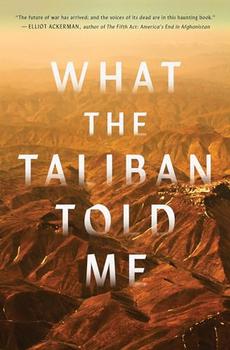Summary | Excerpt | Reviews | Beyond the Book | Read-Alikes | Genres & Themes | Author Bio

This article relates to What the Taliban Told Me
 Ian Fritz's memoir, What the Taliban Told Me, chronicles the author's difficulties processing his role in events that resulted in death and injury to others. Not officially diagnosed with post-traumatic stress disorder (PTSD), Fritz discusses a category of non-physical harm that military experts denote as "moral injury," which he says is closer to what he suffered during his deployment in Afghanistan. But what precisely is moral injury, and in what ways does it differ from the more well-known PTSD designation?
Ian Fritz's memoir, What the Taliban Told Me, chronicles the author's difficulties processing his role in events that resulted in death and injury to others. Not officially diagnosed with post-traumatic stress disorder (PTSD), Fritz discusses a category of non-physical harm that military experts denote as "moral injury," which he says is closer to what he suffered during his deployment in Afghanistan. But what precisely is moral injury, and in what ways does it differ from the more well-known PTSD designation?
According to Syracuse University's Moral Injury Project (cited in Fritz's book), moral injury constitutes "the damage done to one's conscience or moral compass when that person perpetrates, witnesses, or fails to prevent acts that transgress one's own moral beliefs, values, or ethical codes of conduct." As an airborne cryptologic linguist, Fritz identified potential ground threats to U.S. soldiers through close monitoring of Taliban communications. The gunship he flew on would then fire 105mm artillery rounds to kill the targeted Taliban talkers. Eventually, Fritz suffered severe depression and even suicidal thoughts.
The U.S. Department of Veteran Affairs notes there is a great deal of overlap between moral injury and PTSD; guilt and shame are core features of moral injury and are also symptoms of PTSD. However, "PTSD includes additional symptoms such as hyperarousal that are not central to moral injury." Moral injury is just as serious as PTSD, as the VA indicates that "exposure to morally injurious events is associated with both suicidal ideation as well as suicide attempts."
Awareness of the issue among mental health professionals and veterans' service providers is growing. For instance, in Florida, Jacksonville University's Keigwin School of Nursing has a Moral Injury Program that provides key resources and videos to address what they call a "soul wound," which is "not readily seen unless the bearer of Moral Injury is willing to share it with others." The sense of guilt and shame one feels for their actions—and their feelings about feeling that way—can hamper them from seeking help or opening up to friends, family and mental health professionals (Fritz relates his own painful experiences in this respect). As The Moral Injury Project affirms, "the effects of moral injury go beyond the individual and can destroy one's capacity to trust others, impinging on the family system and the larger community.
Research into moral injury is also increasing, and researchers are identifying pathways to recovery. Since feelings of isolation can inhibit sufferers from getting help, "listening and witnessing to moral injury outside the confines of a clinical setting can be a way to break the silence that so often surrounds moral injury," suggests The Moral Injury Project. In this sense, Fritz's memoir is his raw personal testimony of the trauma he copes with daily, and the rest of us should be willing "listeners" for those members of the armed forces who deserve to be heard.
Two US Air Force members demonstrate relaxation training, part of the military's program to address PTSD and other mental health issues, courtesy of US Air Force
Filed under Medicine, Science and Tech
![]() This "beyond the book article" relates to What the Taliban Told Me. It originally ran in January 2024 and has been updated for the
November 2024 paperback edition.
Go to magazine.
This "beyond the book article" relates to What the Taliban Told Me. It originally ran in January 2024 and has been updated for the
November 2024 paperback edition.
Go to magazine.
Read the best books first, or you may not have a chance to read them at all.
Click Here to find out who said this, as well as discovering other famous literary quotes!
Your guide toexceptional books
BookBrowse seeks out and recommends the best in contemporary fiction and nonfiction—books that not only engage and entertain but also deepen our understanding of ourselves and the world around us.